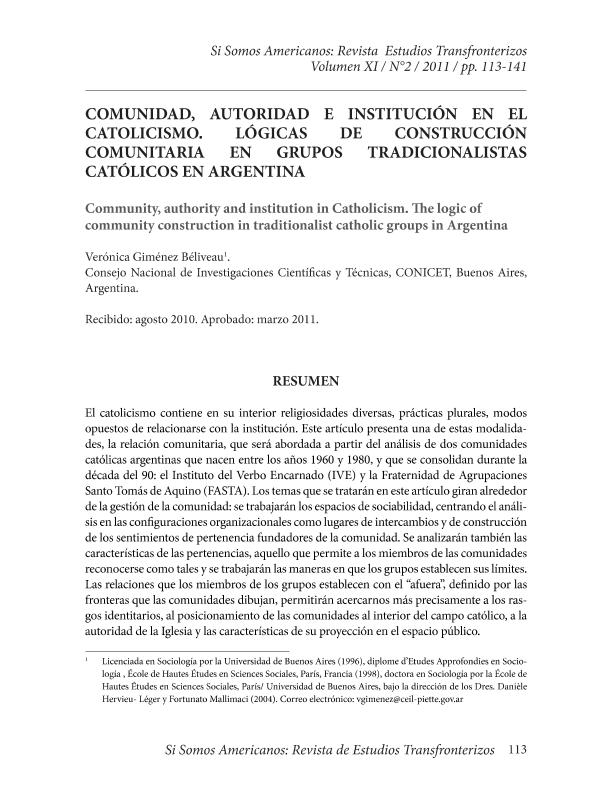Artículo
El catolicismo contiene en su interior religiosidades diversas, prácticas plurales, modos opuestos de relacionarse con la institución. Este artículo presenta una de estas modalidades, la relación comunitaria, que será abordada a partir del análisis de dos comunidades católicas argentinas, que nacen entre los años ’60 y ’80, y que se consolidan durante la década del ’90, el Instituto del Verbo Encarnado (IVE) y la Fraternidad de Agrupaciones Santo Tomás de Aquino (FASTA). Los temas que se tratarán en este artículo giran alrededor de la gestión de la comunidad: se trabajarán los espacios de sociabilidad, centrando el análisis en las configuraciones organizacionales como lugares de intercambios y de construcción de los sentimientos de pertenencia fundadores de la comunidad. Se analizarán también las características de las pertenencias, aquello que permite a los miembros de las comunidades reconocerse como tales y se trabajarán las maneras en que los grupos establecen sus límites. Las relaciones que los miembros de los grupos establecen con el “afuera”, definido por las fronteras que las comunidades dibujan, permitirán acercarnos más precisamente a los rasgos identitarios, al posicionamiento de las comunidades al interior del campo católico, y en relación con la autoridad de la Iglesia, y a las características de su proyección en el espacio público. Catholicism contains within it diverse religiosities, plural practices, opposing ways of relating to the institution. This article presents one of these modalities, the community relationship, which shall be studied based on the analysis of two Argentinean Catholic communities that emerged between the sixties and eighties and became consolidated during the decade of the nineties: the Verbo Encarnado Institute (VEI) and the Fraternity of Associations Saint Thomas Aquinas (FASTA). The issues to be dealt with in this article revolve around the community’s management: spaces of sociability will be worked on, centering the analysis on the organizational configurations as places were exchanges can take place and the feelings of belonging, based on which the communities were founded, are constructed. We will also analyze the characteristics of belongings, whatever allows the community members to recognize themselves as such, and the ways in which the groups establish their limits. The relationships that group members establish with the “outside”, defined by the borders drawn by the communities, will allow us to approach identifying features more precisely, as well as the positioning of the communities within the Catholic field and in relation to the Church’s authority, and the characteristics of their projection into public space.
Comunidad, autoridad e institución en el catolicismo : lógicas de construcción comunitaria en grupos tradicionalistas católicos en Argentina
Título:
Community, authority and institution in Catholicism : The logic of
community construction in traditionalist catholic groups in Argentina
Fecha de publicación:
06/2011
Editorial:
Universidad Arturo Prat
Revista:
Si Somos Americanos
ISSN:
0718-2910
Idioma:
Español
Tipo de recurso:
Artículo publicado
Clasificación temática:
Resumen
Archivos asociados
Licencia
Identificadores
Colecciones
Articulos(CEIL)
Articulos de CENTRO DE ESTUDIOS E INVESTIGACIONES LABORALES
Articulos de CENTRO DE ESTUDIOS E INVESTIGACIONES LABORALES
Citación
Gimenez Beliveau, Veronica; Comunidad, autoridad e institución en el catolicismo : lógicas de construcción comunitaria en grupos tradicionalistas católicos en Argentina; Universidad Arturo Prat; Si Somos Americanos; 11; 2; 6-2011; 113-141
Compartir




